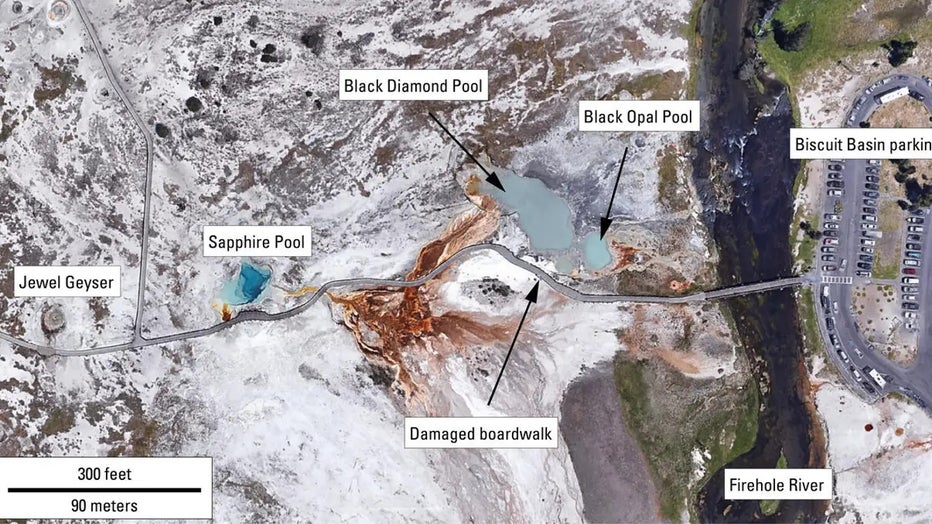Yellowstone's Biscuit Basin to remain closed for summer after massive hydrothermal explosion
Yellowstone National Park’s Biscuit Basin area will remain closed for the rest of the summer after a sudden hydrothermal explosion sent debris and water shooting hundreds of feet into the air Tuesday, destroying a boardwalk and sending dozens of nearby tourists scurrying for safety.
"Back up! Back up! Back up!" yelled a visitor as the event was captured on video, as others can be seen running away from the explosion. Miraculously, no one was injured.
7 THINGS TO KNOW ABOUT YELLOWSTONE NATIONAL PARK
Photos from the immediate aftermath showed large rocks, dirt, and debris scattered across the area, with the wooden boardwalk onlookers had just used to reach nearby Black Diamond and Black Opal geothermal pools left in ruin.
Park officials say the explosion resulted in water suddenly transitioning to steam just beneath the Black Diamond Pool, and was not caused by any volcanic activity. The explosion was mostly directed toward the nearby Firehole River, with some rocks strewn near the explosion site estimated at 3 feet wide, weighing hundreds of pounds.
The explosion even changed the shapes of the Black Diamond and Black Opal pools, NPS said.
YELLOWSTONE SEISMIC ACTIVITY TO BE TURNED INTO LIVE ‘ROCK’ CONCERT
"Both pools are murky due to debris, and the unstable ground around their edges occasionally slides into the water," NPS officials said in a news release. "The water level in the pool rose over the course of the day (Tuesday), and by Tuesday afternoon the roiling transitioned to occasional bursts of hot water that reached about 8 feet in height."

(National Park Service)
By Wednesday, water levels had risen enough that the pools were overflowing and sending their murky water into the Firehole River.
Going forward, given the changes in geology, park officials say small explosions of boiling water are now possible in the Biscuit Basin over the next days to months. As a result, the park has closed the area to visitors for the rest of summer. Grand Loop Road remains open to vehicles, and other nearby thermal basins, like Black Sand Basin, are open, park officials said.
Meanwhile, USGS and NPS geologists will spend the next several days monitoring the area and investigating how the hydrothermal system has changed since the explosion.
Officials said hydrothermal explosions typically occur in the park one to a few times per year, but often in the backcountry where they may not be immediately detected. Similar, but smaller explosions occurred in 1989 at Porkchop Geyser. The last hydrothermal explosion at Biscuit Basin happened in 2009.

